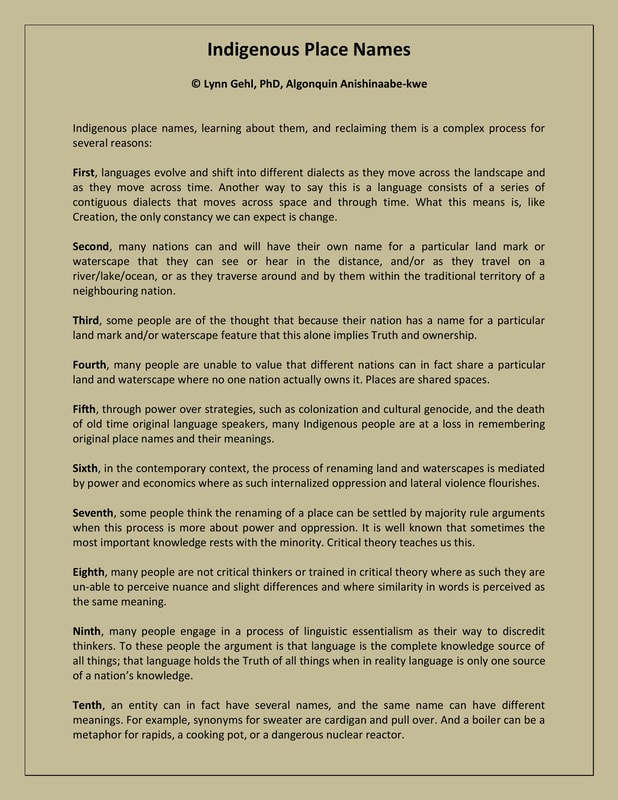|
12/20/2018 0 Comments Indigenous Place Names and AkikpautikAkikpautik: Akik, means kettle or rock basin; Pautik, means cascade; tik, means branch or stick as in pipe stem; Pipe Bowl Falls; Great Sacred Pipe; Creator's First Sacred Pipe. Indigenous place names, learning about them, and reclaiming them is a complex process for several reasons: First, languages evolve and shift into different dialects as they move across the landscape and as they move across time. Another way to say this is a language consists of a series of contiguous dialects that moves across space and through time. What this means is, like Creation, the only constancy we can expect is change. Second, many nations can and will have their own name for a particular land mark or waterscape that they can see or hear in the distance, and/or as they travel on a river/lake/ocean, or as they traverse around and by them within the traditional territory of a neighbouring nation. Third, some people are of the thought that because their nation has a name for a particular land mark and/or waterscape feature that this alone implies Truth and ownership. Fourth, many people are unable to value that different nations can in fact share a particular land and waterscape where no one nation actually owns it. Places are shared spaces. Fifth, through power over strategies, such as colonization and cultural genocide, and the death of old time original language speakers, many Indigenous people are at a loss in remembering original place names and their meanings. Sixth, in the contemporary context, the process of renaming land and waterscapes is mediated by power and economics where as such internalized oppression and lateral violence flourishes. Seventh, some people think the renaming of a place can be settled by majority rule arguments when this process is more about power and oppression. It is well known that sometimes the most important knowledge rests with the minority. Critical theory teaches us this. Eighth, many people are not critical thinkers or trained in critical theory where as such they are un-able to perceive nuance and slight differences and where similarity in words is perceived as the same meaning. Ninth, many people engage in a process of linguistic essentialism as their way to discredit thinkers. To these people the argument is that language is the complete knowledge source of all things; that language holds the Truth of all things when in reality language is only one source of a nation’s knowledge. Tenth, an entity can in fact have several names, and the same name can have different meanings. For example, synonyms for sweater are cardigan and pull over. And a boiler can be a metaphor for rapids, a cooking pot, or a dangerous nuclear reactor. Note: While Akikpautik means Pipe Bowl Falls, Opwagun means Pipe. There is a difference in both the words and meaning; while Pipe Bowl Falls implies an un-articulated Pipe Bowl and Pipe Stem, the second implies a complete articulated Pipe. Note: The Mohawk name for Akikpautik is kana:tsio and it means a boiling pot; a whirlpool in the Ottawa River, where the waterfall has eroded the rock below creating a depression into which the water spills and swirls, creating the boiling effect. (http://geolinguistics.ca/2018/02/03/save-the-falls/) In the Anishinaabe storytelling tradition respect for subjectivity and introspection is crucial. In addition, historically Anishinaabeg inscribed stories and teachings into the land and waterscape as a part of their system of symbolic literacy and land memory. I was fortunate to spend time with Algonquin Grandfather William Commanda during my doctoral work. As a PhD student my interests were regarding Algonquin land and resource rights and traditional knowledge. During our discussions he talked to me about the “Great Sacred Pipe” also known as Pipe Bowl Falls. Grandfather described to me how it was that the falls formed an almost perfect circle like a Pipe Bowl, how the mist rising from the Bowl represented smoke and prayers going up to Creator, and where the rainbows above the Bowl represented two sacred elements, namely Fire and Water or man and woman, coming together in the special act of procreation and Creation. He also talked about how it is that Wìsakedjàk’s, also known as Nanaboozhoo, footprints are found along the Asinabka shoreline. I was honoured to spend time with Grandfather and I hold this time dearly in my heart. Through Grandfather’s story I interpret Akikpautik as the land and waterscape where Creator placed the First Sacred Pipe. In the Anishinaabeg knowledge tradition it is understood that morals such as respect and kindness came before all else. Seeking to discredit my use and understanding of what Akikpautik means, and seeking to discredit my respect for Grandfather’s Asinabka teaching and vision, solely based on linguistic essentialism really should be re-thought as I am not the enemy that keeps the Algonquin poor. Clearly my goal is situated within the Seventh Fire Prophecy in that I am picking up the pieces of knowledge that our ancestors left behind for us to articulate a better future for all things: Water, Trees, Mooz, and Humans. And there is more … The Algonquin Anishinaabe are entitled to live a good life off their land and resources, but Canada will not allow this to happen. Canada is afraid. Situated within the context where colonial Canada only provides small areas of employment and economic prosperity, what results is the Algonquin become at odds with one another. The issue between the Algonquin cannot be resolved through pro and con debates because the bottom line is if the Algonquin had what they were entitled to the debated issues would not exist. Similarly, when settler allies step up to help a particular fraction of Algonquin they really are not the enemy as some people think they are, Canada is. It is Canada that is dividing the Algonquin, and it is Canada that is dividing the Algonquin and settler allies. We really need to think critically versus laterally, and we need to behave better than the way crabs do when placed in a bucket. Canada’s policies and laws will take us all down if we don’t get our acts together. Respect Algonquin and respect our allies, we need one another. We all need clean land, air, and water. Links of interest: https://soundcloud.com/mosaic-publication/dr-gehl-talks-about-construction-on-a-sacred-algonquin-island?fbclid=IwAR1Qg2IG3ejdqg2M0KYWUWH2pSbVWj3ui_BzUy0kR32tWusiJJ-uam9Eey8 https://cusjc.ca/mosaic/2018/11/23/indigenous-names-token-or-tribute/?fbclid=IwAR2A0c7udg3IC6MdsxVQjyswrUVCRjQ305A6szjqvWIK0iRXoqmnSF2w7WE https://watershedsentinel.ca/articles/akikodjiwan/  © Lynn Gehl, Ph.D. is an Algonquin Anishinaabe-kwe from the Ottawa River Valley. In 2017 she won an Ontario Court of Appeal case on sex discrimination in The Indian Act, and is an outspoken critic of the Algonquin land claims process. Recently she published Claiming Anishinaabe: Decolonizing the Human Spirit. You can reach her through, and see more of her work, at www.lynngehl.com.
0 Comments
Your comment will be posted after it is approved.
Leave a Reply. |
|
To subscribe to Lynn's Blog: click here
To subscribe to Lynn's Newsletter: click here To follow Lynn on her Public Facebook Page: click here To subscribe to Lynn's YouTube channel: click here To book Lynn as a speaker: click here To contact Lynn/License her work: click here Copyright Dr. Lynn Gehl, 2024 All Rights Reserved
|


 RSS Feed
RSS Feed
